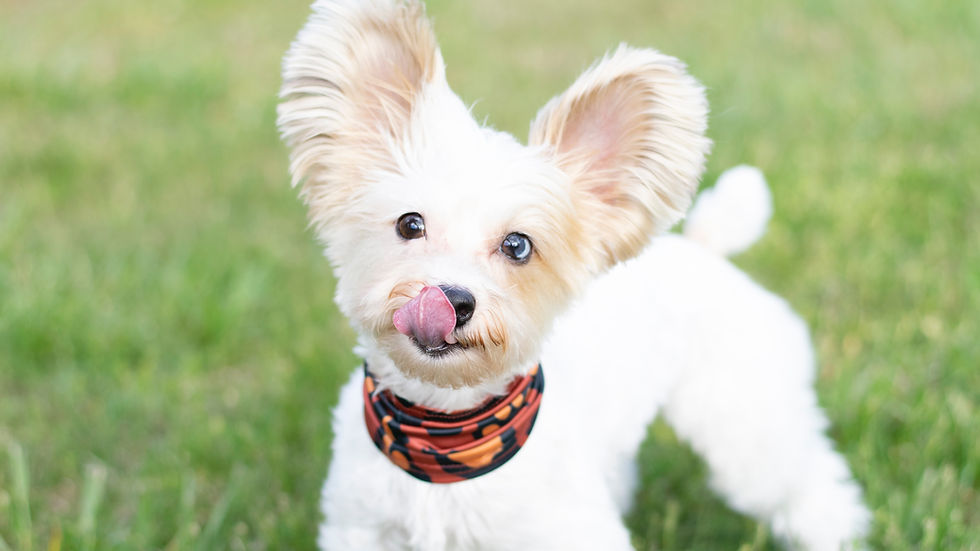Understanding Your Dog's Licking Behavior
- thepapercutemporiu
- Oct 23, 2025
- 4 min read
Updated: Nov 4, 2025
The Affectionate Gesture
One major reason dogs lick their humans is to show love. Just like how we hug or kiss our loved ones, dogs use licking to bond. When your dog licks you, it releases endorphins that can create a feeling of comfort for both of you. For example, studies suggest that when dogs lick, the act may reduce cortisol levels, leading to less stress and more happiness in both the dog and its owner.
Puppies often lick their mothers to seek care and attention. This behavior does not disappear as they grow older. Instead, it continues as a sign of love and trust, often seen in a dog who greets you with enthusiastic licking when you come home.
Communication and Social Behavior
Licking is also a form of communication for dogs. In the wild, dogs lick each other to establish social connections and express submission. For instance, if your dog licks you intensely, it might be trying to communicate its desire for attention or playtime. Research indicates that nearly 70% of dog owners observe licking as an essential way for their pets to communicate. Recognizing this can help you respond better and strengthen your bond.
Taste and Exploration
Dogs learn about their surroundings primarily through taste and smell. When your dog licks you, it may be simply exploring. Your skin might have flavours like salt from sweat or traces of food, making it appealing. This exploratory behavior is especially prevalent in puppies, as they navigate their new world. If your dog frequently licks you after meals, it could be sniffing out those delicious crumbs.

Anxiety and Stress Relief
Sometimes, excessive licking is a sign of anxiety or stress. Dogs may lick themselves or their owners as a comfort measure during tense moments, such as thunderstorms, fireworks, or even when there are changes in their environment. If your dog licks you more in these situations, it may be seeking reassurance. According to the American Kennel Club, around 40% of dogs show signs of anxiety during loud noises. Creating a calm and predictable environment can help alleviate your dog’s stress and reduce excessive licking.
Health Issues
While licking is often a normal behavior, it can sometimes signal health issues. If your dog licks excessively, it’s worth exploring with a veterinarian to rule out medical concerns. Conditions like allergies, skin infections, or gastrointestinal problems can lead to increased licking. For example, a dog with a food allergy might lick its paws more frequently. Keeping track of when and where your dog licks can help you and your vet better understand if there's a problem that needs addressing.
Attention-Seeking Behavior
Dogs are quick learners, and if they realize that licking you gets a positive reaction, they may do it more often. For example, if your dog licks you and you laugh or pet them, they may repeat this behavior to gain attention. To curb excessive licking, provide positive reinforcement for different behaviors, like sitting or engaging in play, instead of rewarding licking.
The Role of Breed and Personality
Different dog breeds have different licking tendencies. Breeds like Labrador Retrievers and Golden Retrievers are known for their affectionate behavior and might lick more than some others, like the more independent Shiba Inu. Individual personality traits also play a role; a nervous dog may lick more often than one who is confident. According to the American Kennel Club, understanding your breed’s characteristics can help you manage your dog’s licking behavior more effectively.

Establishing Boundaries
While licking may be a sign of affection, it’s important to set boundaries if the behavior becomes excessive. Redirecting your dog's attention to toys or other activities can help. Training them to understand when licking is acceptable and when it isn’t is crucial. Consistency is key here. Positive reinforcement can promote more balanced interactions between you and your pet.
When to Seek Professional Help
If your dog's licking becomes overwhelming or is accompanied by other concerning behaviors, consulting a professional is a good idea. A veterinarian can rule out health issues, while a certified dog trainer can provide guidance on managing licking habits. Behavioral training can teach your dog alternative ways to express their feelings and needs, leading to a healthier relationship.
The Importance of Understanding Your Dog
Understanding why your dog licks you so much can significantly enhance your bond. Whether it’s out of affection, a form of communication, or a response to stress, recognizing the reasons behind this behavior is vital. By creating a loving environment, establishing clear boundaries, and seeking professional help when needed, you can ensure that your dog’s licking remains a joyful expression of love and not an overwhelming habit. Remember, your furry friend is expressing themselves in their unique way, and understanding their needs is essential for a happy and healthy relationship.

🐶 Next, explore more from Name Kennel:




Comments